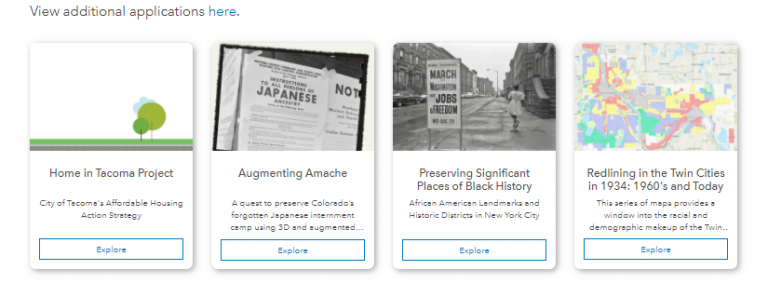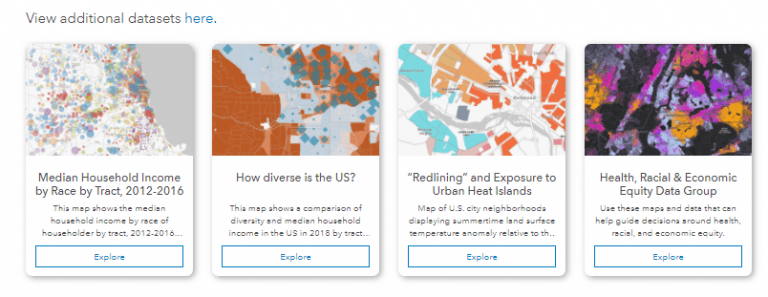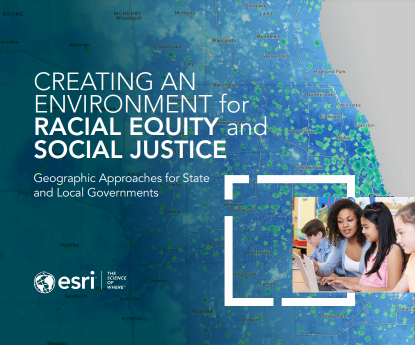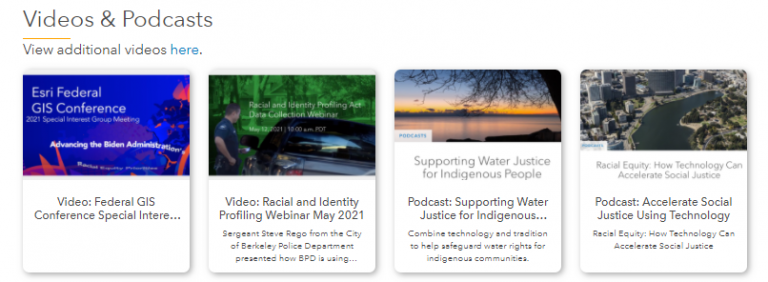Last year on Juneteenth, Esri launched the Racial Equity Initiative and Hub to provide GIS resources for individuals and organizations working to advance racial equity and social justice worldwide. One year later, we reflect on the GIS community’s incredible work, share new resources, and renew Esri’s commitment to bringing the full power of location technology to bear in the fight against racial injustice.

Bringing Together Community Resources
The purpose of Esri’s Racial Equity Hub is to support your racial equity work by bringing together in one place:
- Inspirational use cases and stories from many organizations
- A growing collection of data resources
- Racial Equity Webinars, blogs, ebooks, and other guidance
- New geospatial solutions for racial equity
- Community events & recordings
- Racial Equity Learning resources
Let’s take a walk through key highlights from the past year.
Inspirational use cases and stories
Organizations across all sectors have been busy innovating new ways to leverage GIS technology to advance racial equity, involving communities throughout their efforts. This past year, users added over 100 examples of GIS applications to the “Applications” section of the hub. The collection is growing every day. Want to add your GIS application to the hub? Fill out this survey.

The hub also features user stories in the “Articles” section. Below are just a few examples of the incredible stories featured on the hub this past year:
- How Austin’s Map of Trees Helped City Leaders See and Tackle Social Inequities
- Territorial Empathy Maps Racial Inequality to Take Action
- Geography Brings Equity and Social Justice into Focus in King County
- Maps and Data Strengthen Calls for Housing Equity in Houston
- Maps Show the Real Picture of Race and Equity in Oakland
- City of Tacoma Streamlines the Strategic Planning Process to Address Affordable Housing and Housing Inequalities with GIS
- Rewriting Wrongs: GIS as a Force for Racial Equity in Asheville, NC
A growing collection of data resources
In the “Data” section of the hub, you can find over 75 data layers, web maps, and policy maps across a wide range of racial equity topics including climate and environmental issues, criminal justice, economic data, education, elections, health, housing, infrastructure and more. These layers, along with a large collection of layers on demographic and language information can help inform your work. Below are just a few examples of the data layers and maps featured on the hub this past year, with the list growing regularly.
- Home Owners’ Loan Corporation (HOLC) Neighborhood Redlining Grade
- Internet access by age and race
- Home Ownership Rates by Race
- Redlining and exposure to urban heat islands
- U.S. Heart Disease Mortality Rates 2016-2018 by age, race/ethnicity, and gender
- ACS Health Insurance by Age by Race Variables

Racial Equity webinars, blogs, ebooks, and other guidance
Esri’s racial equity team is developing a body of knowledge and best practices for leveraging GIS to advance racial equity and social justice through working with our users. As patterns of best practices emerge from our user community, we seek to capture and share those through webinars, blogs, ebooks, and other guidance, all compiled on the hub. Below are just a few examples of the guidance shared on the hub this past year:
- Advancing Racial Equity in State and Local Government Webinar Series
- Creating An Environment for Racial Equity and Social Justice ebook
- GIS for Equity and Social Justice Story Map
- Applying Location Intelligence to Address Racial Inequity
- Sharing Black Perspectives on the Racial Implications of Place
- GIS—Visualizing Racial Equity
You can explore all of Esri’s guidance on the “Resources” page of the hub.

New geospatial solutions for racial equity
Working alongside our users, Esri is developing new geospatial solutions to enable organizations to quickly deploy capabilities that support best practice workflows for advancing racial equity and social justice. This year the hub featured three new ArcGIS Solutions for racial equity, including Racial Equity Community Outreach, Police Transparency, and Business Inclusion. You can explore all of Esri’s current and future solutions on the “Resources” page of the hub.

Community events and recordings
The hub is also a place to find upcoming community events and view recordings of past events. The “Events” section of the hub advertises upcoming events, and you can find videos of past recordings on the “Resources” page. For example, racial equity focused sessions at Esri’s 2020 User Conference and 2021 FedGIS conference were featured this year.


Racial Equity Learning Resources
This year for Juneteenth, Esri is excited to announce new training specifically created to support racial equity work your organization and others are doing around the country.
New Foundational Racial Equity Training
We recently introduced the following new online training to help our users incorporate racial equity and social justice best practices into their work:
Updated Training
Esri’s training teams enhanced the following lessons to ensure each includes a more explicit racial equity lens and workflow:
- Map racial disparities in breast cancer mortality rates using ArcGIS Pro, ArcGIS Insights, & ArcMap,
- Examine racial inequities in unsolved murder cases,
- Policy mapping – Improve newborn health,
- Build an app to expand food access, and
- Measure and visualize digital exclusion.
Easier Access to Racial Equity Training
Everyone can now more easily find racial equity training by visiting the Learn Relevant Skills section of the Resources page. You can also use the new Racial Equity filter in Esri’s Learn ArcGIS Lesson Gallery.

Looking Ahead
Juneteenth is a time of reflection for us at Esri on a personal level, our users, and people across the globe. Looking back over the past year, we recognize many of our users’ leadership and unwavering dedication to driving forward much-needed progress.
We at Esri recognize that we also have a role to play in creating a world where a person’s race and place do not determine their life outcomes. We look forward to continuing to work alongside you all in service, partnership, and solidarity.
Sincerely,
Esri’s Racial Equity Team

Article Discussion: